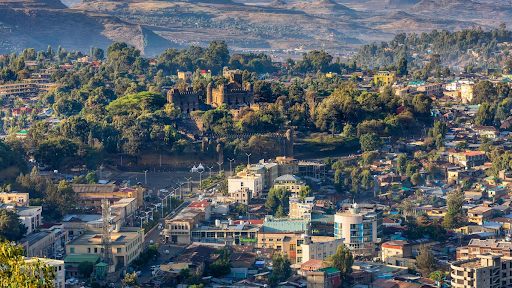Melaku Tefera, God’s little brother,
Spare this child of mine, I’ll not have another.
This heartbreaking lament of parents echoed all over Gondar in the late 1970s as Melaku Tefera, a ruthless military commander of the Derg regime, rampaged through the province in what was to be remembered as one of the bloodiest crackdowns ever undertaken.
At the time, many youths in Gondar had gone underground to fight the Derg under the then-popular party, the Ethiopian People’s Revolutionary Party (EPRP). When Mengistu Hailemariam unleashed Major Melaku Tefera on Gondar, many young men and women fell prey to his merciless hand while many others simply fled.
While most were able to cross the Ethiopian border to Sudan, en route to their final destinations in North America and Europe, those who couldn’t endure the perilous journey perished along the way.
This historical legacy has made Gondar one of the places which receive most of Ethiopia’s remittances and inflows of foreign money now from native migrants who settled in the West.
Addis Zeybe went to the Commercial Bank of Ethiopia, Gondar District Branch, and asked about the current remittance inflow to the city.
Demewoz Balbie, the director of the branch, told us that one of the main services provided by the bank is the money transfer service from abroad to the residents of Gondar.
The bank’s report shows that in the 2019/20 fiscal year, over 10.6 million ETB (around 311,700 USD), in 2020/21, over 9.6 million ETB (around 216,600 USD), and in 2021/22, 8.7 million ETB (more than 167,600 USD) was transferred to Gondar residents through the bank.
The numbers show a slight decline from year to year. Workneh Bazezo, a Remittance Senior Officer at the Commercial Bank’s Gondar District, said on the potential cause for the decline: “Buying and selling dollars on the black market is expanding in Gondar. That could be one reason. The rise of foreign currency exchange day by day is encouraging people to take their money to the black market.”
Remittance services are provided to customers through licensed transferring agents such as Western Union which work in association with banks in Ethiopia. This formal inflow of remittance is exchanged for half the money the informal blackmarket channels offer.
As of October 2022, 1 USD is claimed to be sold on the black market for up to 87 to 100 ETB, which is a significant difference from the 1 USD to 52.6 ETB rate at the bank.
Zewdu Tilahun, an elderly Gondar resident, told us that his means of living is the money his grandson sends him from the United States.
Foreign exchange that is gained through aid and grants may support the country’s economy in a visible way, says Zewdu. However, it is the remittances sent to individuals that alleviate household problems directly playing a role in giving relief.
The Ethiopian Diaspora is dispersed all over the world, with most of it concentrated in North America, Saudi Arabia, Europe, and Sudan.
Workneh says Covid-19 not only affected the remittance flows to Gondar but also other economic channels such as tourism. The remittances also went into decline after lockdowns were declared in many countries. This in turn forced businesses to shut down, limiting the income of the benefactors.
Zewdu doesn’t work, as old age and diabetes prevent him from being as active as he used to be. He gets 500 USD from his grandson every three months which covers all his expenses.
“The money was sent to me once in five months during Covid, not in three months as it used to be. Now Covid is no longer a threat, but the war is going on very near to us. But I am back to getting money every three months,” said Zewdu.
The war which has continued in Northern Ethiopia, however, is keeping the remittance rate from going down, explains Workneh, noting Gondar’s proximity to the epicenter of the conflict, Tigray.
There are people who come to Gondar to get money since banks are closed in Tigray and the areas bordering it with Gondar as Workneh told us. Addis Zeybe has also observed increased crowds and queues at branches of banks in Gondar.
Bank services had been suspended in the areas of Woldia, Kobo, Waghimra, Raya, Adiarkay during the conflict about a year ago. People walked to Debre Tabor, Gondar, and Bahir Dar to get money transferred to them by relatives living abroad, as well as other places in Ethiopia.
The Ethiopian Diaspora from Gondar is highly concentrated in the United States, according to a 2014 report. Apart from sending remittances, the migrants native to Gondar have opened liaison offices in 8 states within the US, and established development and cooperation organizations as well as relief rehabilitation and development associations that “maintain ties with and materially support their places of origin”.
Workneh, on the other hand, says that remittances are supposed to show an increase as demands rise. “The economy is growing with time, multiple bank branches are being opened and the number of employees increasing. If it goes as it is from year to year, it is considered to be declining,” he said.
“Migrant remittances account for over 5% of the Gross Domestic Product (GDP) of Ethiopia and one-quarter of the country’s foreign exchange earnings” - according to claims from a 2017 study by the International Organization for Migrants (IOM).
The remittance sent to the whole of Ethiopia in the 2021/22 fiscal year was 4.2 billion USD.
Melaku Tefera, who is claimed to be responsible for forcing the Gondar youth abroad, has served his jail time for more than two decades and is now a free man living in an unidentified place in Ethiopia. Ironically, some claim that he survives with remittances sent to him by some of his former victims living abroad. Why some Gondar diasporas might be sending money to their old assailant is a puzzle we leave for Addis Zeybe readers to solve.
Edited and co-written by Hiwot Walelign, senior Content Editor at Addis Zeybe


